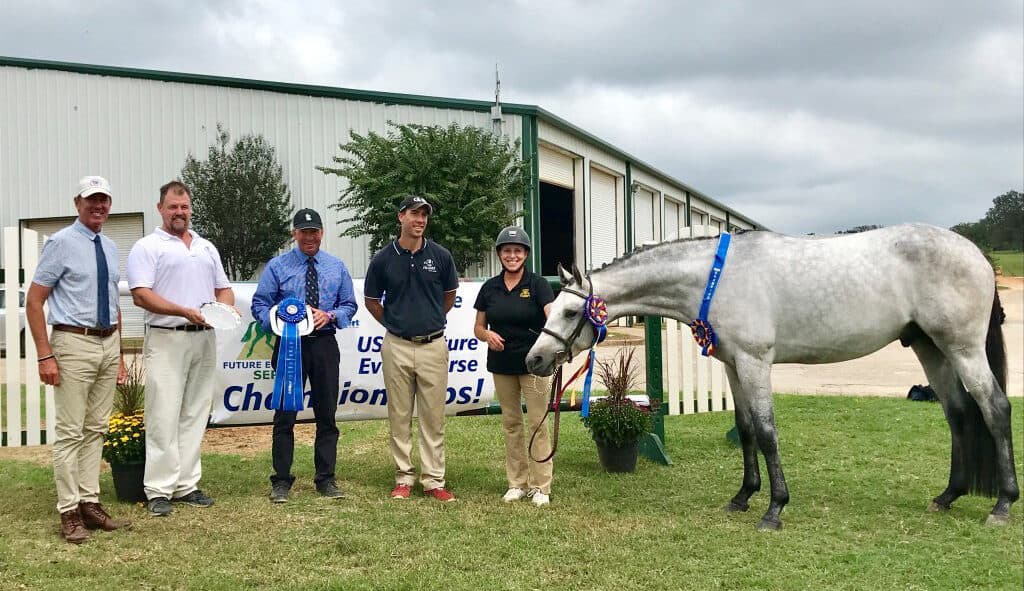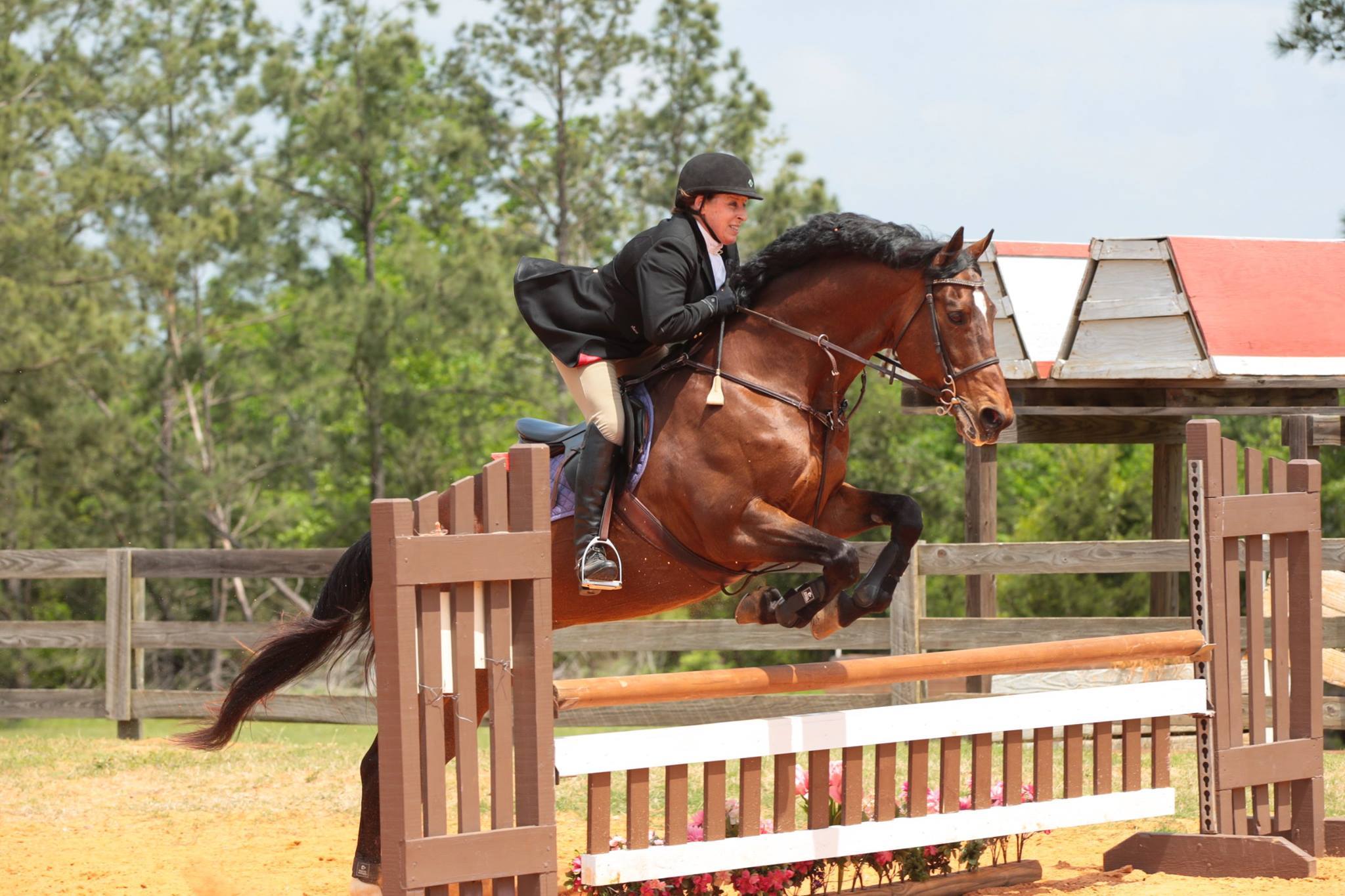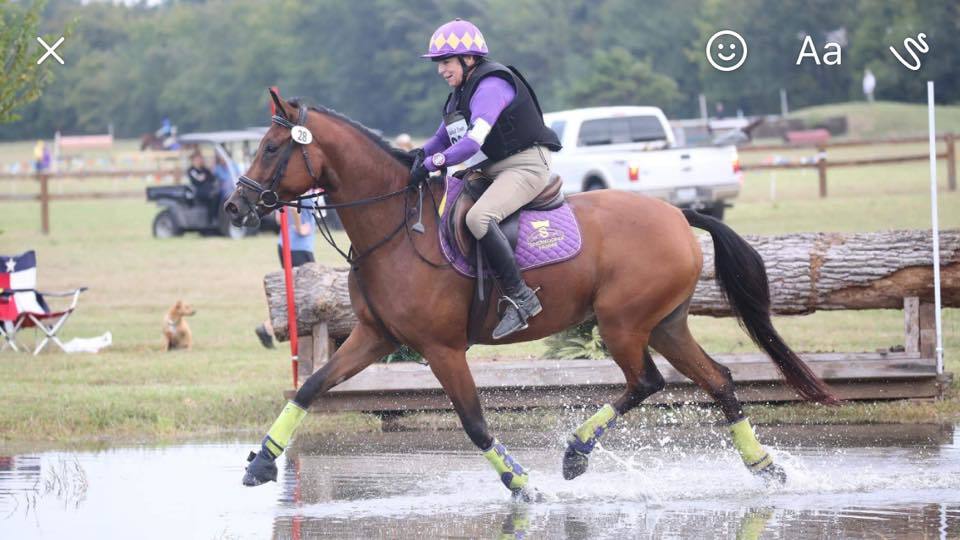Behind the Breeder's Brand: Jayne Lloyd and Snowdonia Sporthorse Complex

After years spent as a professional rider working with young and difficult horses, Jayne Lloyd knew what kind of sport horses she wanted to produce when she got into breeding 12 years ago—competitive, rideable, and trainable that would be suitable for amateurs.
Her purchase of the 1991 AES stallion Diamond Domini (Renkum Englishman x Ruffles) when he was 19 kickstarted her breeding program out of her Snowdonia Farm in Texas and continued until his death five years ago. Now she’s continuing her mission of producing amateur-friendly event horses with her beloved stallion’s offspring while championing and supporting the USEA’s Young Event Horse and Future Event Horse (now under the Young Horse Show Series’ jurisdiction) programs.
“It’s always a coin toss when breeding when you cross this with that, and you’re not guaranteed to get X, Y, and Z. Because I ride so many problematic horses, I thought, let’s start designing a better type of horse that’s more rideable and suitable for the riders involved and the sport that they’re aiming at,” she said.
Born in England, Lloyd worked at a variety of barns before settling in Texas. She worked for former British junior eventing team trainer Gil Watson and was exposed to a large breeding operation at the farm where Watson based out of, which sparked an interest in breeding her own.

“I was around the process and learned a lot about how they did the breeding program there with Thoroughbreds. It was quite helpful,” she said. Lloyd earned her British Horse Society II instructor license and found a passion for bringing along horses from the start and coaching riders.
“Number one was always the training and competing,” she said. “I’ve always been one to develop young horses, and I think through back home with fox hunting, I have a strong seat, and I was able to develop young horses and the problem horses, so that kind of became my wheelhouse.”
Lloyd moved to the United States in 1989 when she was 28, working as a barn manager, trainer, and rider at various facilities in Connecticut and New York before deciding to move to Texas after visiting a friend there. “I’ve been an opportunist all my life. If a door opens, I go through it. It’s like, let’s try this and see how it goes!” she said with a laugh.
She settled in Tomball where she started Snowdonia Farm and came across Diamond Domini through a friend. The stallion had competed in Grand Prix jumping in Europe, but Lloyd introduced him to eventing, and they competed through Training level.
“I decided, let’s go eventing! And he took to it like a duck to water,” she recalled. “I showed him until he was 23 up to Training. He was very sound and never needed any help or injections. That to me is a big deal—the genetic value of their health. What they pass on is very important.”
Lloyd bred her own Thoroughbred mares to “Bam Bam” and offered him to a few people while he was alive. She describes his offspring as a joy to ride and teach with exactly the qualities she’s always wanted—a love and desire for jumping, eager to please, sound, good conformation, three clear gaits, and easy to ride and manage. Bam Bam was on the smaller side at 15.3 hands, so he typically produces horses in the 16-16.2-hand range.
Lloyd kept one of Bam Bam’s sons, the Dutch Warmblood Diamond Davinity (out of Hyperboreas), to be a breeding stallion. He competed in the Future Event Horse classes, earning the 2018 USEA FEH Central Champion title. He’s spent the last few years in the jumper ring with a friend, but Lloyd is hoping to introduce him to eventing now at age 8 and to start to breeding him once he’s AES-approved.
Lloyd has been a supporter of the FEH classes since she began breeding, and in 2018, she approached the USEA about organizing a Central Championship since she felt hauling to the East and West Coast Championships was tough for young horses. She’s now organized a Central Championship at Haras Hacienda in Magnolia, Texas, for five years and will continue on with the YHS Series.

Lloyd, 61, has since moved to new farm in Brookshire, Texas, Snowdonia Sporthorse Complex.
She backed off on breeding during the pandemic, but this year she has three foals on the ground, one from Bam Bam’s frozen semen and two from the Holsteiner Diamante Fino, who’s based on the West Coast.
She has two of her four broodmares in foal for 2024 and hopes to have three in foal for 2025.
Since Lloyd enjoys young horses, she typically keeps any horse she’s bred and starts them with in-hand work, often taking them to Future Event Horse competitions, lunging, long lining, backing, and lots of hacking before selling them on.
Lloyd’s also keeping busy training for her USEF ‘r’ eventing judge’s license and just started on her FEI steward license. She’s hosting qualifiers for YEH and the YHS series at Snowdonia and the regional championships for YHS. Her goal in the future is to host a Central YEH Championship.
She’s thrilled to have her new farm with more space to train young horses and the ability to let others benefit from the facility for their own training.
While she says her small breeding program is always a work in progress, she’s happy to be able to benefit the amateur eventer both with the horses she’s bred and the opportunities she’s helped create with FEH and YEH.
“[With U.S. breeding] we’ve learned a lot from the Europeans, and we’re still in a learning curve, but it’s necessary that we develop our own breeds here,” she said. “We’ve got a lot of good horses available to us now. We have owners that buy the breed or breeders that start breeding and have owners come into the sport and stay with the breeder as an ongoing relationship, which is a perfect scenario because we encourage them to get the horses out early in the first year of showing in hand. It helps them figure out what the horses are able to do at an early age, it trains them to be prepared for the shows down the road, and you get a glimpse of what to expect.”

While it’s sometimes hard to say at the beginning of a horse’s life if they’ll be a four- or five-star horse, Lloyd believes with the right development there’s a better chance of finding out early on in their career.
“When you do the jump chutes, especially with the 3-year-olds and 4-year-olds—that’s very beneficial to see their thought process and scope and how they answer the questions,” she said. “They don’t have to be perfect because they’re learning, but how they respond to the mistakes is what really tells you what kind of competition horse they’re going to be. They can have all the physical attributes they need, but without the mental availability and trainability, it doesn’t really matter. It’s always a positive. OK, well it’s not going to be a four-star horse. That’s OK because every horse has a place. It might make a one- or two-star horse. That’s probably more than ample for most owners unless they really want to find that top four- or five-star horse, then they need to look further.”
About the USEA Young Event Horse (YEH) Program
The Young Event Horse (YEH) Program was first established in 2004 as an eventing talent search. Much like similar programs in Europe, the YEH program was designed to identify young horses aged four- and five-years-old, that possess the talent and disposition to, with proper training, excel at the uppermost levels of the sport. The ultimate goal of the program is to distinguish horses with the potential to compete at the four- and five-star levels, but many fine horses that excel at the lower levels are also showcased by the program.
The YEH program provides an opportunity for breeders and owners to exhibit the potential of their young horses while encouraging the breeding and development of top event horses for the future. The program rewards horses who are educated and prepared in a correct and progressive manner. At qualifying events, youngsters complete a dressage test and a jumping/galloping/general impression phase. At Championships, young horses are also evaluated on their conformation in addition to the dressage test and jumping/galloping/general impression phase. Click here to learn more about the Young Event Horse Program.
The USEA would like to thank Bates Saddles, SmartPak, Standlee, Parker Equine Insurance, Capital Square, Kerrits, and The Jockey Club for sponsoring the Young Event Horse Program. Additionally, the USEA would like to thank The Dutta Corp., Title Sponsor of the Young Event Horse Championships.
About the Future Event Horse Program and Young Horse Show Series
The USEA introduced the Future Event Horse Program in 2007 in response to the popularity of the already established USEA Young Event Horse Program. Where the YEH program assesses 4- and 5-year-old prospective event horses based on their performance, the FEH program evaluated yearlings, 2-year-olds, 3-year-olds, and 4-year-olds for their potential for the sport based on conformation and type. The FEH program is now run by the Young Horse Show Series, under their umbrella.















